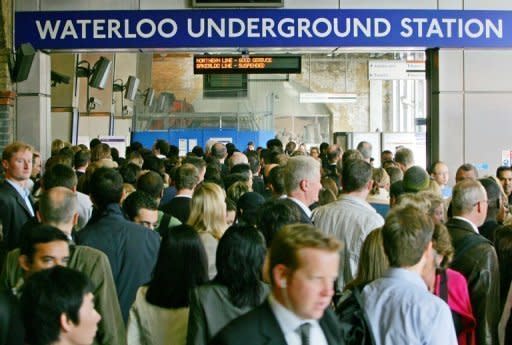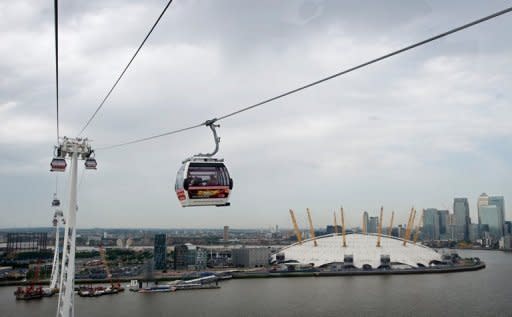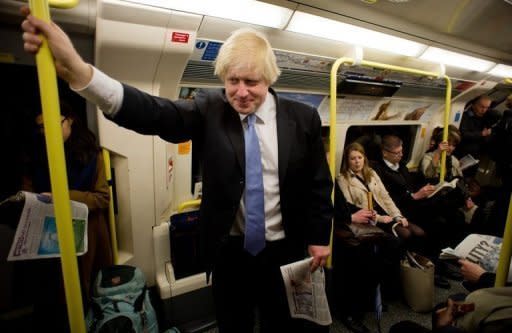Crowded London fears Olympics travel meltdown
A cable car has been strung over the Thames, an athletes' terminal built at Heathrow Airport, and Olympic traffic lanes set up -- yet Londoners still fear the Games will bring their city to a standstill. Organisers are determined that spectators will get to the Games, which open in the British capital on July 27, by public transport, bicycle, or on foot. But London's roads and ageing underground train network are already overcrowded -- and many doubt the fans, athletes, officials and journalists can get to the venues without bringing the rest of the capital grinding to a halt. "London is a big city, and can I absolutely guarantee to you that nothing will go wrong? No, I can't," Britain's Olympics Minister Hugh Robertson admitted recently. "We've done everything we think we were expected to do to make it work," he said of the Olympic transport plan. If people follow the government's travel advice, everything "should be alright". That advice, plastered all over the Underground in recent months, suggests a range of measures Londoners that can take to avoid the crushes -- including walking, cycling, avoiding busy routes and busy times, or working from home. Transport for London (TfL), the public body which manages London's transport system, will have to cope with three million extra daily journeys on the busiest days of the Games, on top of its usual 12 million. TfL has warned delays will be inevitable, but cites its "good" management of last month's celebrations for Queen Elizabeth II's diamond jubilee, when traffic jumped by a third for a weekend, as proof it can handle the Olympics. But a spate of pre-Olympic delays, breakdowns and overcrowded platforms on the Underground have fuelled a sense of impending doom among commuters. "Bank tube station is an absolute nightmare now," blogger Liz Jarvis wrote recently in a tweet addressed to London mayor Boris Johnson. "How will it cope with more visitors?" Johnson has played down the fears, comparing them to the panic in 1999 over the Millennium Bug -- which did not, as some anticipated, wreak global technological havoc. "I know exactly how you feel," Johnson replied to Jarvis. "That is why we are investing so much in upgrades." TfL have promised that a huge programme of works to improve the Tube for the Olympics, costing more than £6.5 billion ($10.2 billion, 8.1 billion euros), will be finished in time for the Games. But the bus system could cause another headache; drivers are threatening to strike three days before the opening ceremony to push their demand for a bonus for working during the Olympics. Tube and train staff, as well as those who man the public cycle hire scheme, have all been promised such a bonus, the Unite union points out. There are also fears that Heathrow Airport in west London, the gateway for almost 80 percent of Games visitors, will buckle under the strain. Europe's busiest airport, already close to saturation, has recently been at the centre of a storm over the huge queues snaking out of passport control for passengers arriving from abroad. The airport claims that 500 extra staff have been hired for the Olympics to fix the problem. Heathrow has also been equipped with a new temporary terminal, reserved for Olympic competitors, which will operate for departures from August 13 to 15, the three days after the closing ceremony which are expected to be the busiest. Also new is a cable car running above the Thames, which will allow people to travel between two major venues, the O2 Arena in Greenwich, which hosts gymnastics and other sports, and the ExCel exhibition centre, the venue for boxing and other disciplines. A fast train, the Javelin, will ferry spectators to the Olympic Park in east London, from St Pancras, where the cross-Channel Eurostar trains arrive, in seven minutes. Despite these innovations, what worries many Londoners is the Olympic lanes, specially reserved for the movement of athletes and officials, which go into operation from July 25. The move has especially infuriated taxi drivers, who have demanded access to the lanes. "Our fear is that passengers won't understand why they're sitting in heavy traffic while there's an empty lane next to them reserved for the Olympic family," said John Thomas, chairman of the Licensed Taxi Drivers Association. "It will be a complete and utter shambles," he said.




